Commanders!
"From the Battle of Poitiers to the Battle of Verdun, from Normandy to the Somme, I was with every one of those who fought that day—and the thousands of days before. I am the Spirit of War!"
The new
 IX
IX
Strv K
, a unique Tier IX Premium tank, storms the battlefields to the loud riffs of heavy metal. You haven't seen anything like this before.
The special Spirit of War 3D style has been created specifically for the Strv K, literally changing its appearance. In addition to its unusual look, this style has many unique features, from fresh Marks of Excellence on the Strv K's gun to a brand-new, exclusive heavy metal soundtrack. But the main feature of this 3D style is its dynamic and lively glow, which changes depending on the situation on the battlefield.
The vehicle was created in collaboration with renowned Swedish heavy metal band Sabaton, and it can be seen in the music video for their new song, "Steel Commanders." The vehicle is manned by the brave musicians themselves, assisted by the Spirit of War.
The missions may be over, but you can still purchase the tank for real money and the 3D style for in-game gold in the Premium Shop until September 8 at 10:00 CEST (UTC+2).
Sabaton's Participation
Even starting with the earliest ideas for this 3D style, World of Tanks developers were in constant contact with Sabaton. The musicians took an active part in creating the style and were passionate about the entire process.
The name of the band speaks for itself: It is a plate boot. And what are plate boots associated with? Knights and their armor, of course! However, creating a concept to unify medieval knights and multi-ton tanks was not an easy task. And thus, the "Spirit of War" was created: It shows the transformation from a knight into a tank.
In the game, the Strv K continues the plot of the music video. The Spirit of War, embodied by a medieval knight, travels through time and ends up in a tank. The in-game vehicle becomes the logical continuation of this story. The person fighting in this tank then becomes a part of the story.
The Strv K is more than just another vehicle in the game. It has its own story that can be shared with World of Tanks players. The creation of the Spirit of War 3D style, in this way, would have been impossible without Sabaton's enthusiastic participation.
Working on the style took several months, and its appearance changed several times. Initially, the concept was this: The tank is a knight riding a horse, where the hull is a warhorse protected by armor, and the turret is the rider holding a spear.
It wasn't easy to create a style that would look like this. We decided to cover the chassis with a two-layer screen, which imitated a quilted blanket that would protect the "warhorse" from arrows. Then, we wanted to decorate the rack behind the turret with fabric so that it looked like a knight's cloak. And there was also an idea to decorate the aft part with a collection of weapons—and many other ideas.
Upon revision, additional requirements appeared, such as decorating the armor with Scandinavian ornaments and adding a banner to the vehicle.
Based on these requirements, our artists created the first prototypes of the style, as seen here:


These prototypes showed that the standard approaches to the creation of 3D styles were irrelevant. Usually, creating the visual component for a 3D style looks like adding various elements to a vehicle model. This method didn't work here—stylizing the tank to look like a knight had nothing to do with placing historically appropriate objects on a vehicle. In the style prototypes, the Strv K looked like a rookie squire rather than an experienced knight.
Then, the new concept appeared quite literally overnight. Now, the Spirit of War style is not an attempt to recreate some image piece by piece, but rather a solid creation of a powerful magic blacksmith who decided to forge a tank.
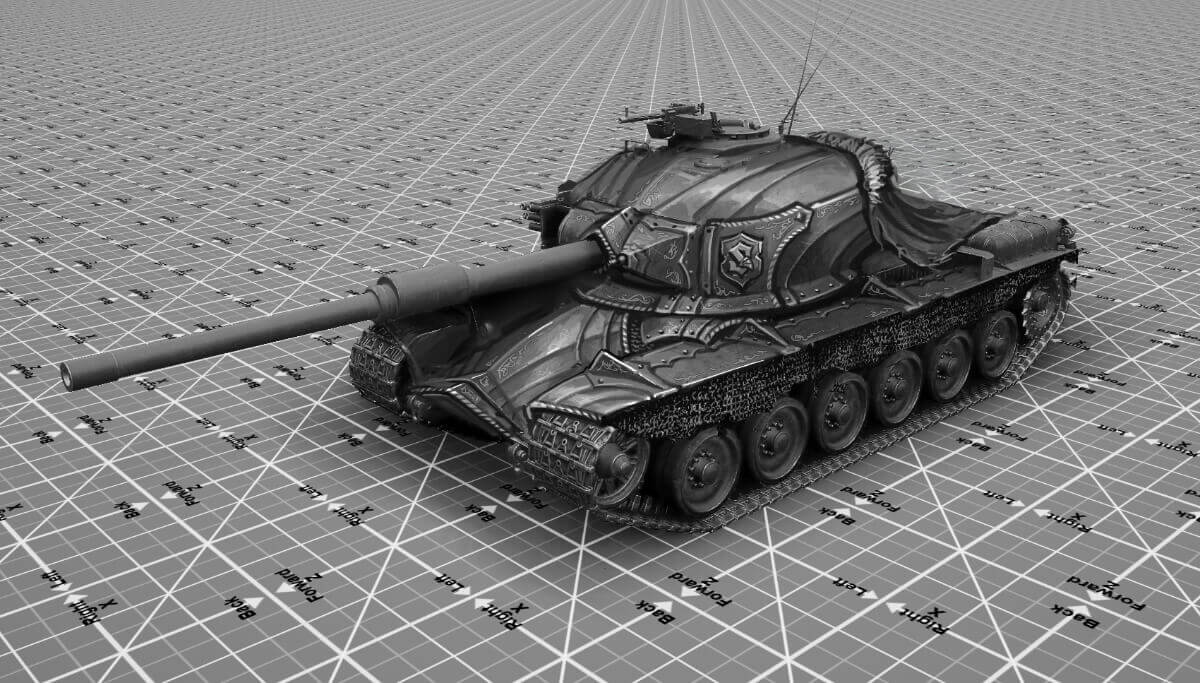
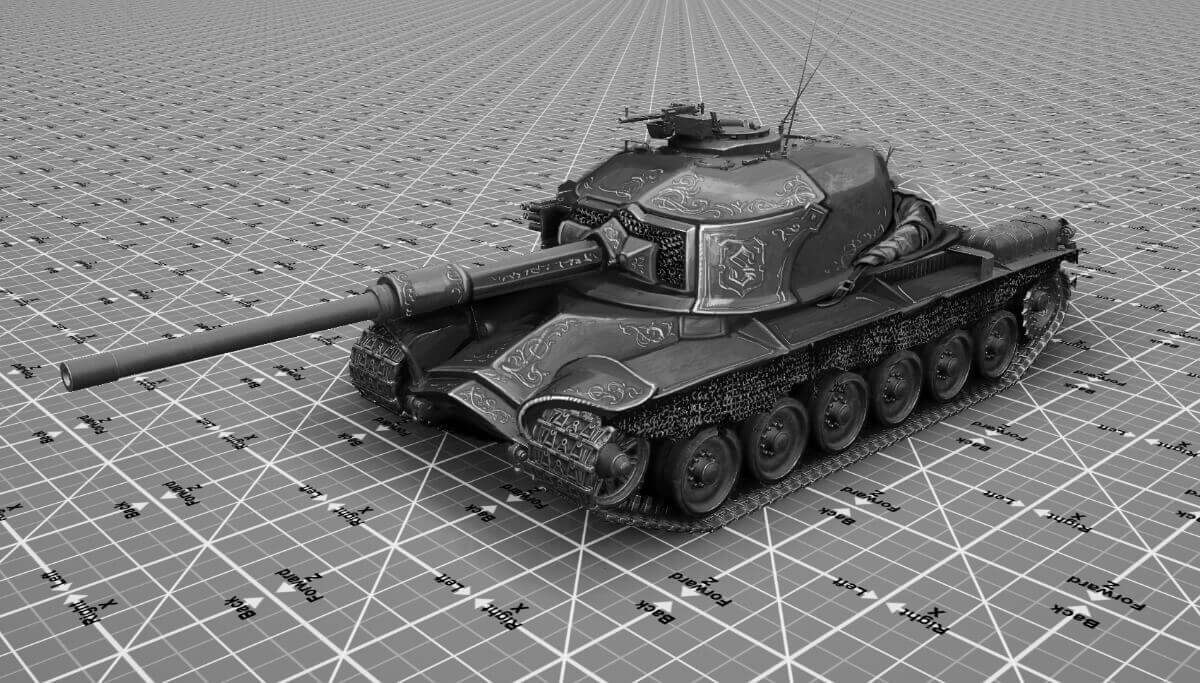
The first iteration depicted elements of rounded armor, but this appearance didn't match the collision model of the vehicle (in other words, the model used to calculate hits on the vehicle). In the second iteration, this mismatch was taken into account.
A Ghost in Armor
The vehicle was literally created from plate armor, and every element was refined—the rollers, armor cuts, the aft part of the turret, triplex, and many other elements. Despite the fact that, from this point on, the final concept was established, the appearance of the 3D style had undergone many small but important changes. Every little thing was fine-tuned.
Much time was devoted to the aft parts of the turret and hull. This way, the cuts did not immediately appear on the hull, and their location changed over time, as they were initially closer to the turret. The shape of the exhaust duct had also been carefully chosen.
During one of the iterations, we came up with the idea to make the barrel faceted—to "twist" it. However, even such a seemingly small change took time before becoming final. In the process, even the number of faces changed.
The banner was eventually removed but solely because it blocked the view in gameplay.

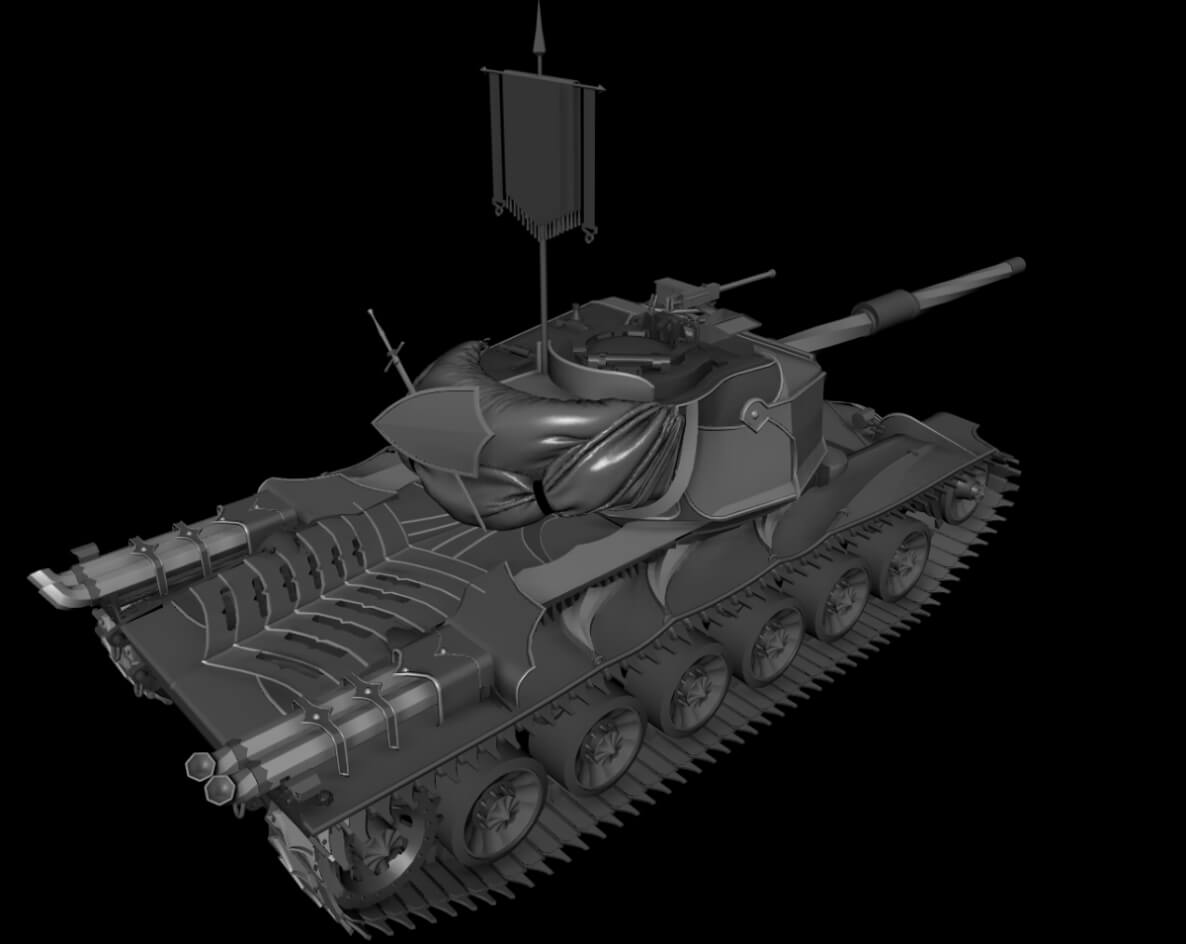
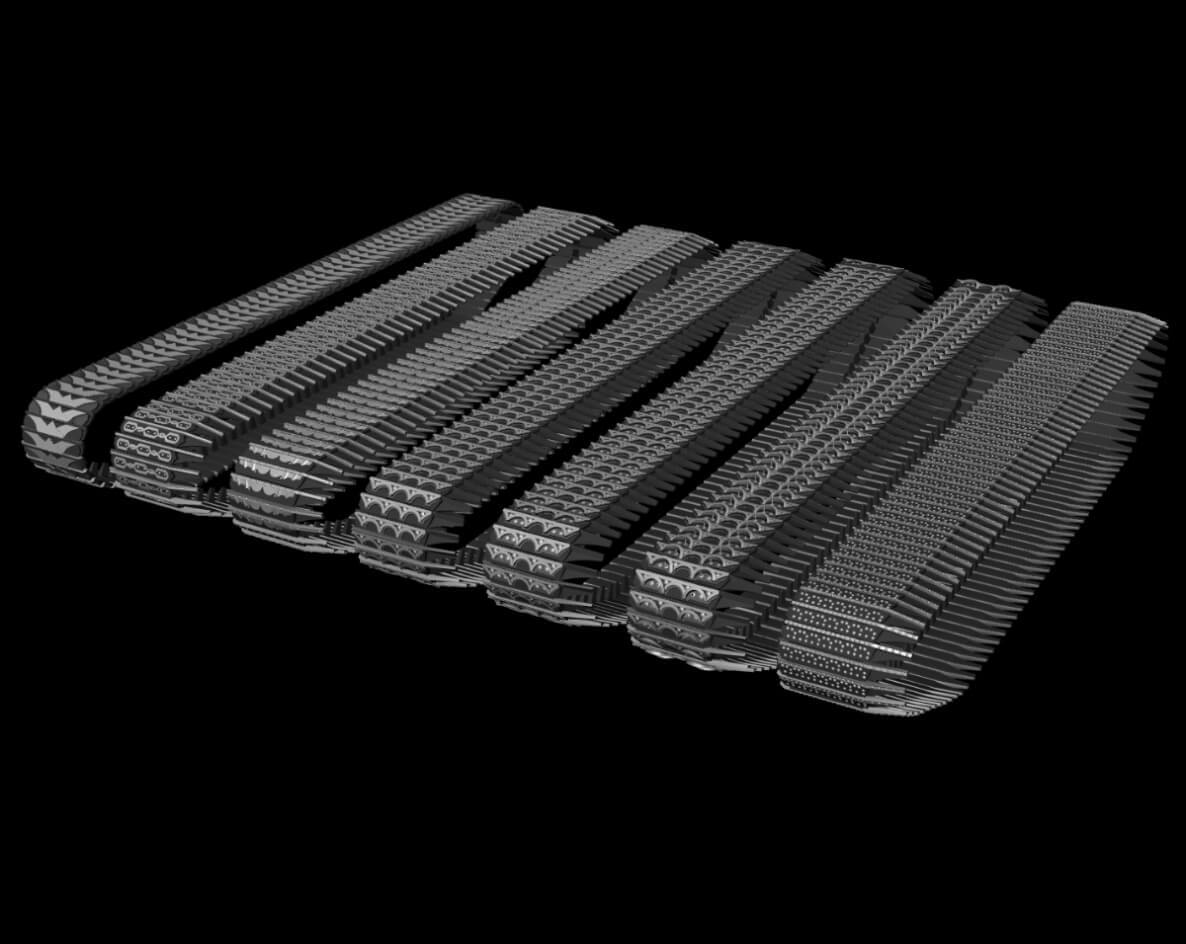
Right after preparing the 3D model, the team continued to work on its look in a different way. The task was to determine the final degree of the vehicle's wear. We didn't want to make it battered, as if it was created by an inexperienced craftsman. At the same time, we did not want to make the armor look perfect and polish it to look like a mirror. We were creating a vehicle for the Spirit of War, not a museum exhibit! We met somewhere in the middle. Some spots still had dents from forging, even large ones, but in general, the armor was high quality.
The armor of the late Middle Ages was a real work of art. Not only did they provide excellent protection, but they were also richly decorated. "Let's do the same!", the designers thought. But some complications arose even here. The historical, floral ornamentation of a knight's armor did not suit the image of either the northern knight or Sabaton. Therefore, we created our own ornamentation specially for the Spirit of War style, taking Scandinavian culture into account.
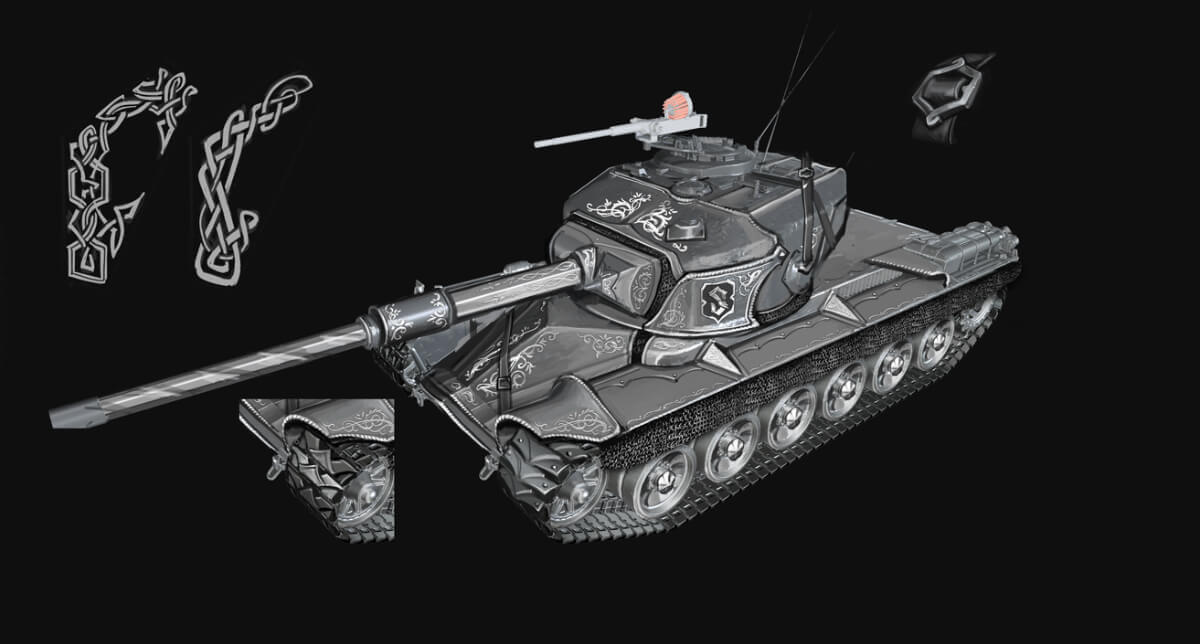

Who Are You, Spirit of War?
“Feel your heart beating. Slow it down. Fire between beats. This is just a target—listen to me and we will win. I am the Spirit of War."
Each time the countdown ends, the Spirit of War revives the Strv K and guides it to glory—the main reward of every warrior.
For our developers, the spirit of chivalry was associated with the mythical Lancelot, King Arthur, and other brave heroes of ancient legends. Therefore, when selecting a color to convey the presence of the Spirit of War in the tank, our designers immediately abandoned any harsh, aggressive tones. The Spirit of War is a neutral entity. Neither evil nor good. The Spirit is only looking for an object in which to manifest its power and create a perfect symbiosis. It represents war itself, but it does not provoke or trigger it. And this needed to come across correctly.
Red, associated with aggression, was immediately rejected. With blue and green, although they have many different associations, their cold tones were not suitable for a warlike entity. Eventually, we landed on the warm tones of neutral yellow. But color alone is not enough. A lot of work has gone into making the Spirit of War's glow look like a living thing.


The Final Result
“The road of war never ends. Nobody remembers where it started, and nobody knows where it leads. On this road, a sword makes room for a musket, and arrows for bullets. On the same road, chain mail became a cuirass, and later the cuirass was replaced by tank armor. From here, one can see the walls of Agincourt and Stalingrad, the shores of the Somme deformed by craters, the burning fields of Prokhorovka, a thick fog over Poltava, and the molten sands of El Alamein. At all times, those who took this path are forever remembered. They found their place in the pages of history books. And I hear the voices of many heroes who never made it to the end of this road. But at all times, I was there. I saw pain and despair. But I also saw endurance and courage, valor and mercy. I am the Spirit of War, clad in steel. I am a witness and a chronicler. I am memory itself."
Our developers tried to find the right vehicle for this 3D style. They had a choice of several tanks. They wanted it to be a Swedish tank, and above all, it had to be simple and clear for players.
Although our vehicle looks like a medieval warrior, it is still a tank—a formidable weapon created by 20th century engineers. We did not forget that when creating the Spirit of War 3D style.
















